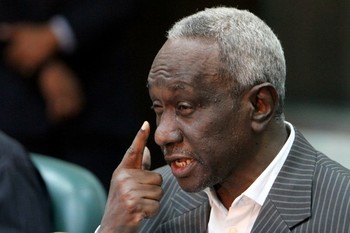Sudan’s VP Taha suggests Bashir could run for a new term
November 6, 2013 (KHARTOUM) – The Sudanese First Vice President Ali Osman Mohamed Taha said that the ruling National Congress Party (NCP) will ultimately decide whether president Omer Hassan al-Bashir would run for a new term in 2015 or not.

VP Taha said in an interview aired today on Doha-based al-Jazeera TV that Bashir genuinely does not want to apply for a new term.
“I know that he does not want to continue ruling, but the decision is up to the party and the people,” he said.
He criticized the reformists within the party who submitted a memo to Bashir saying that they presented no solutions in lieu of lifting fuel subsidies which the government implemented in late September.
Taha went on to say that any respectable political party mandates that its members express their objections from within and not to the public.
The signatories to the petition which included lawmakers and retired army officers, called for reinstating the subsidies due to its “harsh” impact on ordinary Sudanese and demanded that the government prosecute those behind the use excessive violence against protestors.
The violent clashes erupted between demonstrators and security forces following government’s decision to remove fuel subsidies lead to about 84 deaths, according to official figures, although activists, rights groups and opposition parties put the death toll at more than 200.
The signatories also urged Bashir to form a mechanism for national reconciliation comprised of various political forces and assign the economic dossier to a professional national economic team.
“The legitimacy of your rule has never been at stake like it is today” they said in their letter to Bashir which was seen as a direct challenge to the president who is now the country’s longest serving leader.
An NCP commission of inquiry established by Bashir recommended the dismissal of the top reformist figure and ex-presidential adviser Ghazi Salah Al-Deen Al-Attabani along with two other members and the suspension of nine others for one calendar year.
The NCP leadership bureau afterwards endorsed the recommendations and referred the matter to the NCP Shura (consultative) Council to review and issue a binding decision.
Al-Attabani and other dismissed members announced afterwards their intention to form a new party which was downplayed by the NCP as having little significance.
VP Taha said that divergent views in any political body could generate debate and brainstorming but claimed that some do not respect institutional process.
“Our problem [as Sudanese] is that we have no patience on political practice in the framework of institutions. People cannot tolerate that the decision be with institutions and not individuals” he said.
He disclosed that a cabinet reshuffle will be announced within two weeks and that opposition parties may be given major ministerial posts depending on outcome of dialogue with them.
Taha said that Bashir is leading the reform process himself and that the reshuffle is part of that.
He denied that corruption is being protected by the state and stressed that anyone proven to be corrupt will be prosecuted.
Asked about Sudan’s position regarding the ouster of Egypt’s president Mohamed Morsi, Taha reiterated that this is an internal matter.
However he warned that any attempt to exclude Islam or Islamists from the political life will “fail”.
“Islam is the way out for the people in the region and we do not care about threats of any party,” Taha responded when asked if Cairo could view his remarks as a threat to them.
Sudan’s Islamist government has appeared uncomfortable with the developments in Egypt given the common ideology they shared with Morsi and the Freedom and Justice Party (FJP) which brought him to power.
Khartoum insisted that it is neutral to the change in Egypt and that it an internal matter.
(ST)
